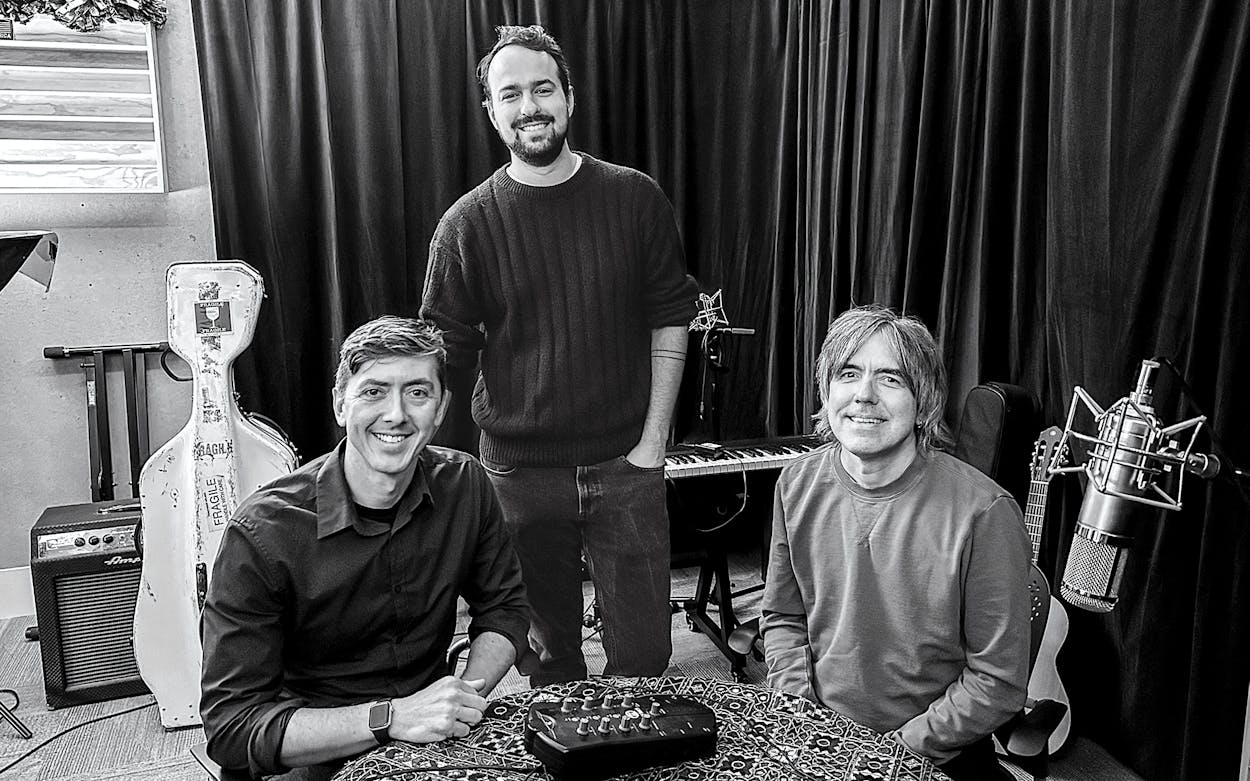The best thing about my office is its location, just across a narrow hallway from the studio where several of my colleagues create aural magic. One morning, I’ll hear Brian Standefer, our talented multimedia producer, playing a lovely passage on his cello. The next afternoon, I’ll eavesdrop on Brian and veteran podcast producer Patrick Michels as they assemble our latest audio story. They’ll play a few seconds of a recorded interview, then hit pause. Patrick will say: I think it’s more powerful if we cut that last sentence. Brian will add: We can wait a couple of beats, start the music, then return to the voice-over.
Creating a narrative podcast requires special storytelling skills that Brian and Patrick possess in abundance—and are teaching to writers on our staff. Interviews must be conducted in a different manner than for a written story, with an emphasis on open-ended questions that encourage elaboration. Sensitive microphones are used to capture not only voices but also sounds that place the listener in a specific setting: say, gravel crunching under truck tires or the screeching of a hawk. Music—often composed and played by Brian—is subtly layered into the podcast to capture a mood or signal a change of scene. The writing must follow a certain cadence, ending each episode with a hint of what comes next.
When we first started producing narrative podcasts a few years ago, we had little idea how difficult and expensive it would be. Had we known, we might not have tried. That would have been a shame, because listeners often tell us that they feel a special investment in the stories we tell via audio. I got a taste of that connection a couple of years ago, when we launched a hit podcast entitled Tom Brown’s Body, about the mysterious death of a popular high school student in a small Panhandle town. When we had aired about half the episodes, I attended a charity fundraiser in San Antonio, and a swarm of friends and acquaintances beelined over to share their theories about the killing.
We’re hoping listeners feel a similar engagement with our latest podcast, entitled White Hats, about the controversial two-hundred-year history of the legendary Texas Rangers. The host is senior editor Jack Herrera, whose older relatives in South Texas grew up fearing violence from Rangers. With help from freelance contributor Cat Cardenas, executive editor Michael Hall, and senior editor Christian Wallace, Herrera guides listeners through the Rangers’ complex legacy: from their intrepid investigations that brought infamous killers to justice to the atrocities committed by some Rangers against Indigenous peoples and Mexican Americans. “We take a hard look at ugly incidents that have only gotten attention relatively recently,” Jack says. “But we put those incidents in context and report on the more professional and diverse organization the Rangers are today.” He added: “I’m off to Houston tomorrow to interview the first Latino chief of the Texas Rangers.”
Patrick joined Texas Monthly in 2021 after gaining experience with podcasts at the investigative public radio show Reveal and at the Texas Observer. “When I tell people that I produce podcasts, they often think of Joe Rogan,” Patrick says, “so I have to explain that podcasts like White Hats are really audio documentaries.” Patrick works closely with Jack and the other writers on the voice-over scripts and with Brian on the flow of the episodes. “It is,” Patrick says, “very challenging and collaborative work.”
Brian, an accomplished musician, composer, and sound engineer, joined Texas Monthly in 2018. He has played with the Santa Fe Symphony Orchestra and toured with the Alejandro Escovedo Orchestra. Brian says he wanted various episodes of White Hats to include “the early tejano music and Anglo folk music” of two hundred years ago, along with a blend of Texas music from later periods. He had to cut our interview short because a fact-checker had just turned up a problem with an episode that was set to air just three days later. Over the weekend, he and Patrick and Jack would rewrite the script, rerecord the voice-over, and rescore the music. Sadly, I wasn’t in the office to hear that work in progress, but I hope you’ll join me in listening to the finished version on our website, or wherever you get your podcasts.
This article originally appeared in the January 2023 issue of Texas Monthly with the headline “White Hats.” Subscribe today.









